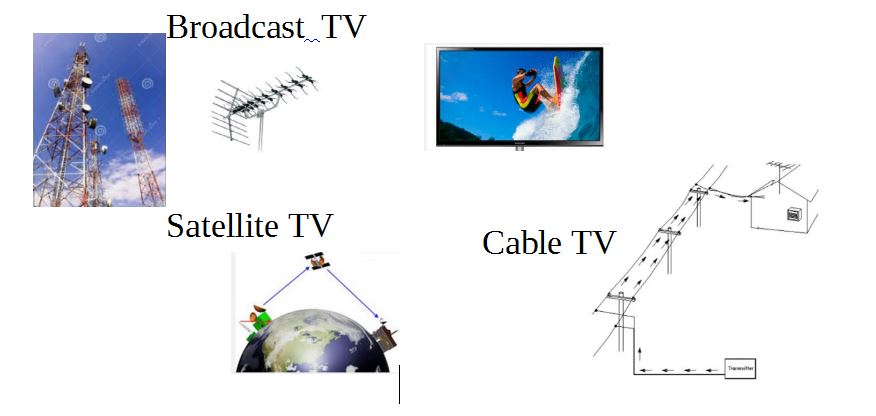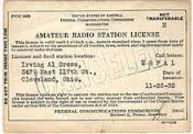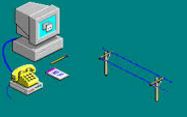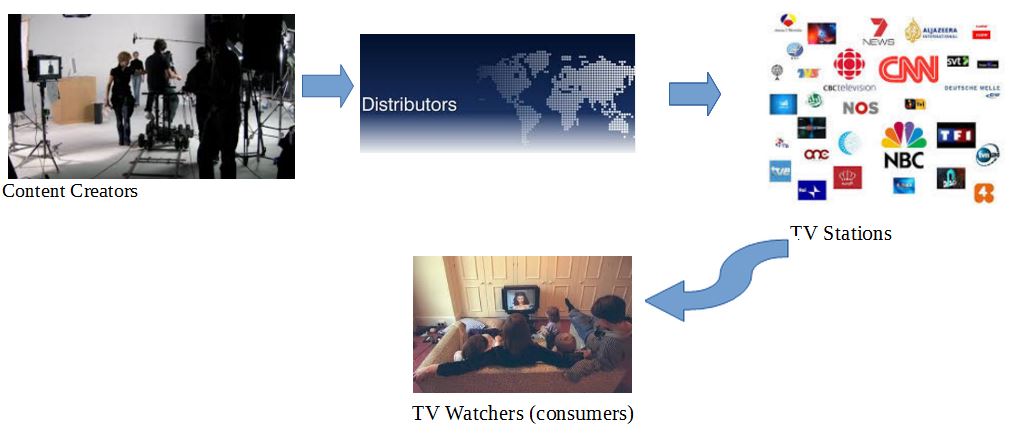Table of Contents
Internet TV
A video was created based on this web page. Rather then reading this material you can watch a video of it at this link:
What is Internet TV?
You can look to Wikipedia to find out:
https://en.wikipedia.org/wiki/Internet_television
But it can mean different things to different people.
Wikipedia uses the term Web TV to describe content that is only presented on the internet. But if in the future more content is watched on the internet than is broadcast, them the we might have to use the term broadcast TV to make a distinction.
It is difficult to describe what internet TV is by having to refer back to traditional TV. To me the big thing internet TV has going for itself is that it has the potential to remove control from a few players and governments and give that control to all people, as it happening with other forms of media. eg. Social Media
Because of this I consider the above link that describes what internet TV is, to be to restrictive. It tends to define it based on conventional TV
Types of Internet TV
- Catch up TV eg ABC Iview http://iview.abc.net.au/
- Streamed traditional TV eg ABC News 24 http://www.abc.net.au/news/abcnews24/
- Video on Demand eg Netflix https://www.netflix.com/au/
- YouTube https://www.youtube.com
- Webinars and Hangouts eg. Broadband for Seniors Webinars http://bfseniors.com.au/events/?tribe_event_display=past. Google Hangouts http://geoff.greig.net.au/docuwiki/doku.php?id=how_to_participate_in_online_training
- Periscope https://www.periscope.tv/
- Media center software like Kodi https://kodi.tv/
- Traditional Web pages with video links (like this one)
Differences between Internet and Traditional TV
If internet TV is the same as traditional TV, only it is delivered via the internet, than how is it any different to Cable TV?
- - Cable TV is usually a subscribed for service provide at a subscription cost
- - Internet TV can be subscribed for or not
- - An internet TV subscription can be paid for or not, eg of a non paid for one is YouTube. Their are many others. Eg of Paid for one is Netflix
- - Cable TV usually requires a special cable set top box that is owned by the provider is proprietary to them.
- - With Internet TV no set top box is required. It uses the open standards of the internet.
- - Cable TV usually has a limited number of channels where the content is scheduled at specific times
- - Internet TV has no channel limits and all content can be viewed at any time
- - Cable and broadcast TV is provided by only a few organisations, Foxtel and the major commercial TV networks
- - Internet TV, because of it low entry cost and lack of government regulations (see below) can be provide by anyone, eg anyone can set up a YouTube channel at no cost. The only cost is bandwidth, which is relatively very inexpensive
- - Only a restricted number of licences are issued for Broadcast TV, hence they have a high value, multi $ millions.
- - No licence is required to be a internet TV distributor of content, so anyone can be one
- - No licence is required to be an Internet Service Provider (ISP), again anyone can be one
- - There are legal restrictions as to what can be presented on cable or broadcast TV
- - There are far less legal restrictions as to what can be presented on internet TV
- - Cable and broadcast TV technologies and legal restrictions limit where content can be presented
- - As the internet is word wide and has a few legal restrictions the content of internet can be world wide. Language is more like to limits its penetration
- - Any legal restrictions by a country on the internet can be worked around because the internet is world wide. Content can be hosted anywhere and created, consumed and operated from anywhere else.
- - All traditional TV costs. Free to air via the prices paid for goods and services that are advertised, cable via subscription, government run via taxes
- - Although internet TV can have similar funding as traditional TV it also can be completely free as is free software on the internet.
- - Internet TV can, and has the ability to use business models that have not been used with traditional TV. Eg Crowd Funding and like Shareware
- - Internet TV can be two way. The viewer can also be a presenter or co-presenter
Hear is a short film (4 Minutes) on How the internet is Killing Television:
Comparison of the History of TV and the History of the Internet
History of Why TV is like it is today
- Printing press invented about 1440 and the Royalty used it as a means of influencing the masses by controlling what was printed, via copyright
* Radio invented about 1895, governments saw it as a way of communicating with the masses, so wanted to control it
- Radio, controlled by governments, via licensing, US about 1920
- Because restriction of number of licenses this drove the price up
- TV,invented about 1920 followed Radio, but with even fewer licenses issued (Aust 1956) the price was even higher
- Traditionally those that controlled the earlier media, the newspaper barons, bought the TV licenses because they cold afford it.
- Governments offset the power of the owners of the TV licenses by legislation and direct government TV stations
So basically TV was a evolution from previous technologies, that could be seen happening, and a response was made
Why is the internet like it is today
- It stated as part of a way for university academics to communicate with one another
- Because of that governments where disinterested in it.
- Most people and governments did not understand it or realize its potential
- Even some technology corporations did not realize its potential, like Microsoft
- It grew very fast very quickly, from almost nothing in 1969 to what it is today
Unlike TV the internet did not evolve for previous technology that people understood. It was thrust upon people. But most embraced it and now accept it as part of their way of life. But because it is world wide and not owned by any person or organisation governments can not control it like they can with TV
The internet is often described as a  disruptive technology. Because it disrupts what has happened in the past
eg. Power of newspapers, Ability of governments to regulate, like with taxi licences via Urber and controlling the money supply via Bitcoin
disruptive technology. Because it disrupts what has happened in the past
eg. Power of newspapers, Ability of governments to regulate, like with taxi licences via Urber and controlling the money supply via Bitcoin
Will internet TV be a disruptive technology?
Downside of internet TV
Currently the biggest downside of internet TV compared with traditional TV is that is relies on internet speed. If you have slow internet connection the video may stop and start so you end up with a bad watching experience. However, if possible, this can be overcome by downloading the content and watching it later.
Observations of Traditional TV Vs Internet TV
Traditional TV:
- Broadcast recorded material the majority of the time, but at scheduled times
- Live TV entertainment is very rare
- Live News broadcasts have a lot of pre-recorded material
- Even crosses to live on location news usually only have a reporter standing where an event has happened
- That only leaves live Sport
- Basically traditional TV stations purchase content and resell it via advertising
- Recording broadcast TV can be difficult especially at preset times as TV stations traditionally dont start and or finish programs at the advertised times
Internet TV:
- Can be a repository of most content that has ever been created
- Content can be requested by the user at any time and delivered where ever their is internet access
- Content can be be delivered to any internet devise
- Can eliminate the need to record
- Could bi-pass the TV companies and middle people and allow the consumer to deal directly with the content creators
- Because of other technologies, that have lowered to cost of producing content, it could create a entire new cottage industry
- Other than language it can provide a direct world wide market to content creators
- Allows new ways to be able to do business, business models
- Allows the streaming of traditional TV beyond broadcast, technical and legal limits
- The owners of live sport could deal directly with the consumers of sport
- If allowed at the game sports fans could stream live to consumers so providing 100's or 1,000's of camera views
OTHER STUFF

Even though Digital TV has the ability to allow you to watch multiple Camera angles very few Australian TV broadcasters have transmitted such content.
With HB TV (Hybrid TV) now called Freeview Plus, which requires a Internet connection, the end user gets a greater choice as to what they can see, but a lot of it could be small recorded snippets.
In the case of TV sport it could get to the stage where the copyrights holders of the material bi pass the TV broadcasters and sell ther material directly to the watchers via the internet. If sporting bodies can do so why not other creators of traditional TV material. This is already happening with Google with Youtube.
Currently even the latest smart TV's have very low powered computers in them and the traditional TV remote is not designed to do what can be done with a computer keyboard and mouse or a touch screen devise.
Young users of traditional TV content eg
Younger people may never go to the ABC to watch anything.
The ABC TV program “Good Game” is about computer gaming. Computer gaming, in terms on money, is bigger than Hollywood and has been so for some time The ABC also have a online version of “Good Game” called “Pocket” which is quite different from the broadcast version. Shorter, 10 minutes and far less edited. Those that watch it may not even know it is a ABC program. They find it via social media and it is very popular with young people that are into gaming.
Do the Commercial TV Broadcasters all synchronize ther Ad breaks?
Is or is going to be, that Broadcast TV is a waste of Spectrum that would better be used for mobile data
Should it only be used for Live TV and everything else is on the internet














